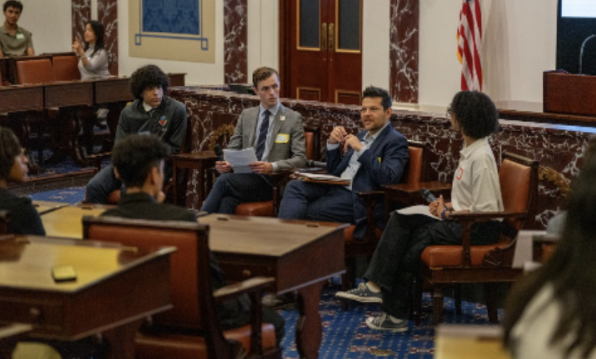Students Explore Civic Engagement at "Democracy Now" Conference
Humanities Workshop
By Ivy Burling ‘26
On May 18th, Milton Academy teachers Lisa Baker, Alisa Braithwaite, and Melissa Figueroa, as members of the interscholastic organization Humanities Workshop, hosted a year-end conference in Dorchester centered around the theme “Democracy Now.” At the Edward M. Kennedy Institute for the United States Senate, the event brought together students from the Academy of the Pacific Rim, Boston College High School, Boston Collegiate Charter School (BCCS), Boston International Newcomers Academy, John D. O’Bryant School of Mathematics and Science, and Milton Academy to explore civic engagement through presentations and panel discussions.
Iván Espinoza-Madrigal, Executive Director of Lawyers for Civil Rights, delivered the keynote address on the future of civil rights in American politics. Milton student Rhys Adams ‘26, along with Aron Ewing of Boston College High School, and Mabel Rodríguez Salas of BCCS moderated a panel discussion with Espinoza-Madrigal. Later, students from each of the schools presented projects on political themes such as misinformation, protest culture, and creative political writing in a symposium-style format designed to encourage peer-to-peer learning and discussion.
Before the symposium, Espinoza-Madrigal spoke about the current political environment and how young people can engage productively. He opened his remarks with the concept of “cathedral thinking,” which framed his remarks for many students and adults present at the event. “Imagine this,” he said, “you stand in the middle of a field, in your hand a single stone, you’re asked to lay it down and make the foundation of a building…You won’t see the final building, and you won’t be around when the structure rises and reaches for the sky. But you lay your stone down carefully and with intention. This is cathedral thinking.” He pointed to Gaudí’s Sagrada Familia and the Great Wall of China as examples of projects begun by visionaries who knew they would never see the final products and emphasized that this mindset of perseverance and vision also applies to current issues such as the integration of public schools and the fight against climate change. Finally, he shared a Spanish phrase, Se hace el camino al andar, which translates to “The path is made by walking,” highlighting the necessity of creating progress, even without the guarantee of witnessing the outcome.
Following Mr. Espinoza-Madrigal’s remarks and questions from student panelists, the event continued with three representatives of the Boston Mayor’s Youth Council: Lila Conley, Bridget Blair, and Samuel Falke. They shared how their involvement in the council has empowered them politically and enabled them to effect change. Each representative highlighted different projects they had worked on with the council, and one student shared how the council had allowed him to hear diverse perspectives from his peers that he had not before. Also present was George Mason University art professor Chawky Frenn, whose visual exhibition We the People was displayed in the lobby of the event.
Students then presented a wide range of projects showcasing their schools’ engagement with political themes, including two creative writing publications from Milton Academy, where students explored political topics through original pieces, as well as civic engagement studies from Milton’s American Government elective, taught by Dr. Gokce. Additionally, several language projects from other schools focused on campaign donations and Latin American democracy. Boston International High School students shared their efforts in improving schoolyard spaces, and many other presentations demonstrated diverse facets of youth civic engagement. Another table was hosted by the Boston branch of the National Organization of Minority Architects, whose booth tackled the intersection of social justice and housing in Massachusetts.
The environment was lively and active, with students moving from project to project discussing and learning from one another. Marcial Flores, an AP Spanish teacher at BCCS, praised the symposium format as a major improvement from previous years; specifically, he enjoyed seeing students learning from each other on a choice basis, encouraging discussion. This sentiment was echoed among teachers and students, including student moderator Aron Ewing, who noted that it was “really amazing—all those young people coming together to show their passion for changing the world and really empowering them to go after the things they want to do.”
The event aimed to help students recognize the civic power they hold. Humanities Workshop co-founder Lisa Baker explained that the conference sought to “promote the critical importance of a humanist approach to the urgent social issues of our times,” adding that “With a complex and human understanding of a problem, we are more prepared and more committed to make change.” Many student attendees expressed appreciation for seeing their peers passionately and creatively engaging with politics. Rue Tanzi ‘26 said that the event helped her feel that “students from all over were united in science and art, all because they held a common principle and interest.”Aron Ewing reflected, “I think before the event, I was definitely a very cynical person. Mr. Espinoza-Madrigal talked about having hope for a lot of things. I think before that, I was definitely questioning… what can we really do? Now I’ve kind of realized that you might as well just take that step individually, do what you can, because if…we all take our steps individually over time, it’s going to make progress.” Humanities Workshop alternates between planning years and programming years; next year, the teachers involved will strategize new events for the 2026-27 school year.
